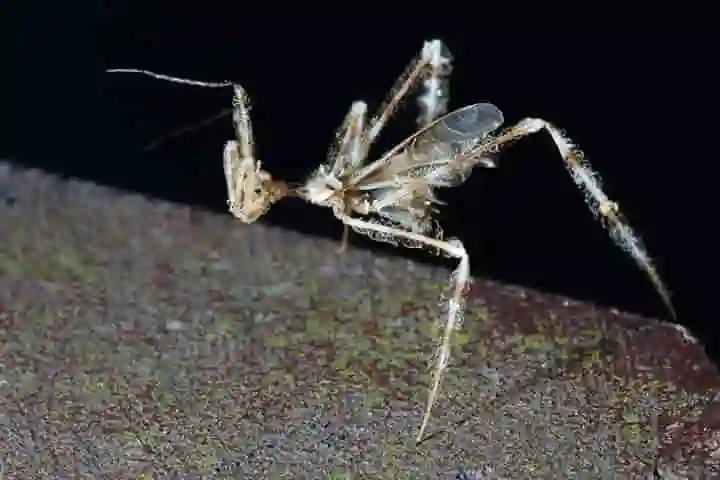

Assassin bugs who deceive spiders and lull them into believing that they are harmless and then strike them fatally (Pic. Courtesy projectnoah.org)
<p>
<strong>Stealth and deadly strike is what marks assassin bugs apart from other predators. Living up to their name, they shadow their prey which includes small invertebrates, killing them with their poisonous proboscis.</strong></p>
<p>
What really makes these bugs interesting is the method they use to prey on spiders, whom they deceive in a rather unusual way.</p>
<p>
These creatures use their antennae to tap spiders and confound them, giving enough time for the bugs to go for the kill through their poisonous strike, said researchers. The study according to an article in sciencenews.org was published in the Biological Journal of the Linnean Society.</p>
<p>
The research gave peep into what can be best described as advanced hunting tactics while taking on dangerous prey.</p>
<p>
<iframe allow="accelerometer; autoplay; clipboard-write; encrypted-media; gyroscope; picture-in-picture" allowfullscreen="" frameborder="0" height="315" src="https://www.youtube.com/embed/asOuniA_XmQ" title="YouTube video player" width="560"></iframe></p>
<p>
Some species of the sub-family of the assassin bugs — thread-legged &ndash; virtually stay in the lion&rsquo;s den, that is spending their lives with those whom they should avoid, the webs of spiders. Quietly moving on the spider&rsquo;s silk making sure that the vibrations created feel agreeable, they move to strike fiercely, holding the front legs of the spider and inoculating them with poison.</p>
<p>
Ecologists Anne Wignall and Fernando Soley observed two species of Stenolemus assassin bugs while they preyed on spiders and discovered their knack of knocking lightly their antennae on spiders once they reached striking distance from them.</p>
<p>
Wignall from the Massey University in Albany, New Zealand observed: <a href="https://www.sciencenews.org/article/assassin-bugs-tap-spider-prey-distract-lethal-strike?utm_source=Editors_Picks&amp;utm_medium=email&amp;utm_campaign=editorspicks103121">&ldquo;It struck us early on that tapping prey</a> was a really strange thing to do. Watching [the bugs] spend so much time and effort on stealth, only to essentially tap [the spiders] on the shoulder was absolutely fascinating.&rdquo;</p>
<p>
Intrigued by this behaviour as to why the bugs tap, Wignall and Soley, of the Organization for Tropical Studies in San Jos&eacute;, Costa Rica, decided to examine in the laboratory, the behaviour of 30 web-building cellar spiders (Pholcus phalangioides).</p>
<p>
The scientists copied the tapping of the bugs&rsquo; antennae by brushing the leg of the spider with the hair of the dog. Following this tapping, the researchers evaluated the responses of the spiders by placing a vibrating tuning fork on the web, thereby copying an insect struggling in the web.</p>
<p>
<strong>Also read: </strong><a href="https://www.indianarrative.com/science-news/augmented-reality-helps-people-to-overcome-the-fear-of-spiders-119913.html"><strong>Augmented Reality Helps People To Overcome The Fear Of Spiders!</strong></a></p>
<p>
It was found that the tapped spiders were less aggressive than those that weren&rsquo;t tapped, often ignoring completely the fork four times. They also attacked the fork about 25 percent as often as their untapped counterparts.</p>
<p>
According to Wignall, by emulating the variety of physical touch that these solitary spiders feel from other fellow spiders, the assassin bugs are able to contain or reduce their aggressive instincts and levels. Remarking on this, she said: &ldquo;Whenever they do come across another spider, it&rsquo;s usually because it&rsquo;s a close relative such as a sibling in the nest, or a potential mate. Both of which are situations in which aggression would not be a good idea.&rdquo;</p>
<p>
<strong>Also read: </strong><a href="https://www.indianarrative.com/science-news/study-reveals-a-new-facet-of-jaguars-personality-as-they-hunt-and-play-together-121414.html"><strong>Study reveals a new facet of jaguars&#39; personality as they hunt and play together</strong></a></p>
<p>
Agreeing with Wignall, Ond&#345;ej Mich&aacute;lek, invertebrate zoologist of Czech Republic&rsquo;s Masaryk University in Brno, observed that the researchers have a &ldquo;completely valid hypothesis.&rdquo; Elaborating on this, he added that several spiders avoid cannibalism by the means of using special tactile signals that could be mimicked by smart skilful and competent predators thus outwitting the arachnids.</p>
<p>
Wignall now wants to go ahead with more research on this subject. She intends to study and comprehend in detail as to the number of taps which are required to keep the spiders quiet and the number of species of spider that the bugs are able to deceive.sc</p>
Prime Minister Narendra Modi lauded the signing of the landmark India-UK Free Trade Agreement on…
United Kingdom Prime Minister Keir Starmer on Thursday said that the UK-India FTA is the…
A Visiting Indian medical team on Thursday began treatment of patients injured in a fighter…
Israel's Ministry of Foreign Affairs (MFA) issued a strongly worded statement categorically rejecting the claims…
A twin turboprop Antonov An-24 passenger plane carrying 47 people, including five children, went missing…
British Prime Minister Keir Starmer will host Prime Minister Narendra Modi in the UK on…